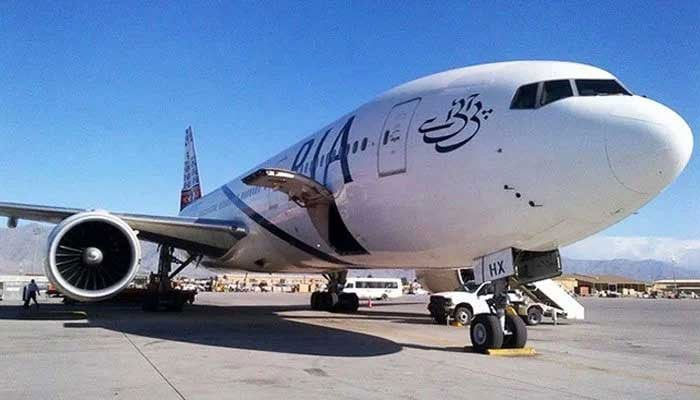PIA: time to cut the cord
There isn’t a company like Pakistan International Airlines (PIA) -- anywhere in the world. There isn’t a company with accumulated liabilities of Rs830 billion and total assets of just Rs171 billion-nowhere in the world.
PIA is a global anomaly, a black hole of political patronage, inefficiency and corruption; three-in-one. Between 2008 and 2024, nine prime ministers cycled through Pakistan’s corridors of power: Yusuf Raza Gilani, Raja Pervez Ashraf, Mir Hazar Khan Khoso, Nawaz Sharif, Shahid Khaqan Abbasi, Nasirul Mulk, Imran Khan, Shehbaz Sharif, and Anwaarul Haq Kakar. The skill sets of all three major political parties -- PPP, PML-N, and PTI -- have been tested.
Amidst this political carousel, one constant remained: PIA’s relentless slide towards complete financial ruin. Over a span of 16 years, PIA’s losses and liabilities surged from just Rs73 billion to a staggering Rs830 billion, averaging Rs84 billion in losses under each prime minister. Conclusion: governments led by the PPP, PML-N, and PTI lack the skill set required to run an airline.
On October 31, of the six consortiums that had pre-qualified to bid, the government received only one bid of Rs10 billion, far below its expected minimum of Rs85 billion. This disappointing outcome raises serious questions about the handling of PIA’s privatisation process. Despite earlier assurances of a competitive bidding environment, the outcome reveals major flaws in the strategy, planning, and execution of the privatization process. Conclusion: the current government led by the PML-N does not have the skill set needed to successfully privatise PIA.
On October 26, Czech Airline, the flag carrier of the Czech Republic, ceased operations after 101 years of service. In 2012, Malev Hungarian Airlines, the flag carrier of Hungary, ceased operation after over 90 years of flying. Sabena, the flag carrier of Belgium and one of the oldest airlines in the world, ceased operation in 2001 due to financial problems and strikes. Varig, the flag carrier of Brazil and one of the largest airlines in South America, filed for bankruptcy in 2005 and ceased operations.
Transaero Airlines, Russia’s largest airline, filed for bankruptcy in 2015 and ceased operations. Air Bosnia was founded in 1994 and ceased operations in 2015 due to financial difficulties. Air Italy, originally known as Meridiana, was rebranded in 2018 but ceased operations in 2020 due to financial issues.
What, then, is the way forward? The overwhelming evidence of systemic failure, political patronage, pervasive corruption, and losses nearing the trillion-rupee mark make it clear that PIA’s continued existence is financially unsustainable. With PIA losing Rs250 million of Pakistani taxpayers’ hard-earned money every single day, every delay compounds the financial damage. The government must now consider the most pragmatic and fiscally responsible approach: ceasing operations and liquidating the airline’s assets to prevent further losses and mitigate the financial burden on the nation.
-
 Melissa Jon Hart Explains Rare Reason Behind Not Revisting Old Roles
Melissa Jon Hart Explains Rare Reason Behind Not Revisting Old Roles -
 Meghan Markle Eyeing On ‘Queen’ As Ultimate Goal
Meghan Markle Eyeing On ‘Queen’ As Ultimate Goal -
 Japan Elects Takaichi As First Woman Prime Minister After Sweeping Vote
Japan Elects Takaichi As First Woman Prime Minister After Sweeping Vote -
 Kate Middleton Insists She Would Never Undermine Queen Camilla
Kate Middleton Insists She Would Never Undermine Queen Camilla -
 King Charles 'terrified' Andrew's Scandal Will End His Reign
King Charles 'terrified' Andrew's Scandal Will End His Reign -
 Winter Olympics 2026: Lindsey Vonn’s Olympic Comeback Ends In Devastating Downhill Crash
Winter Olympics 2026: Lindsey Vonn’s Olympic Comeback Ends In Devastating Downhill Crash -
 Adrien Brody Opens Up About His Football Fandom Amid '2026 Super Bowl'
Adrien Brody Opens Up About His Football Fandom Amid '2026 Super Bowl' -
 Barbra Streisand's Obsession With Cloning Revealed
Barbra Streisand's Obsession With Cloning Revealed -
 What Did Olivia Colman Tell Her Husband About Her Gender?
What Did Olivia Colman Tell Her Husband About Her Gender? -
 'We Were Deceived': Noam Chomsky's Wife Regrets Epstein Association
'We Were Deceived': Noam Chomsky's Wife Regrets Epstein Association -
 Patriots' WAGs Slam Cardi B Amid Plans For Super Bowl Party: She Is 'attention-seeker'
Patriots' WAGs Slam Cardi B Amid Plans For Super Bowl Party: She Is 'attention-seeker' -
 Martha Stewart On Surviving Rigorous Times Amid Upcoming Memoir Release
Martha Stewart On Surviving Rigorous Times Amid Upcoming Memoir Release -
 Prince Harry Seen As Crucial To Monarchy’s Future Amid Andrew, Fergie Scandal
Prince Harry Seen As Crucial To Monarchy’s Future Amid Andrew, Fergie Scandal -
 Chris Robinson Spills The Beans On His, Kate Hudson's Son's Career Ambitions
Chris Robinson Spills The Beans On His, Kate Hudson's Son's Career Ambitions -
 18-month Old On Life-saving Medication Returned To ICE Detention
18-month Old On Life-saving Medication Returned To ICE Detention -
 Major Hollywood Stars Descend On 2026 Super Bowl's Exclusive Party
Major Hollywood Stars Descend On 2026 Super Bowl's Exclusive Party




